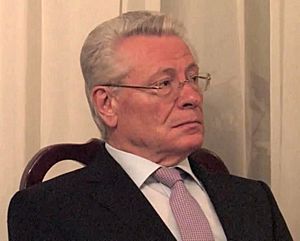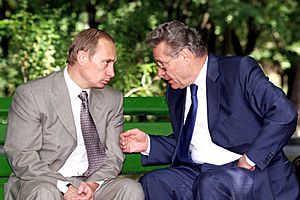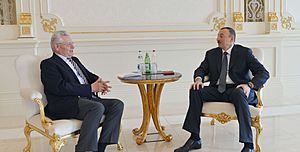Petru Lucinschi facts for kids
Quick facts for kids
Petru Lucinschi
OR
|
|
|---|---|

Lucinschi in 2012
|
|
| 2nd President of Moldova | |
| In office 15 January 1997 – 7 April 2001 |
|
| Prime Minister | Andrei Sangheli Ion Ciubuc Ion Sturza Dumitru Braghiş |
| Preceded by | Mircea Snegur |
| Succeeded by | Vladimir Voronin |
| President of the Moldovan Parliament | |
| In office 4 February 1993 – 9 January 1997 |
|
| President | Mircea Snegur |
| Prime Minister | Andrei Sangheli |
| Deputy | Dumitru Moțpan Nicolae Andronic Dumitru Diacov |
| Preceded by | Alexandru Moșanu |
| Succeeded by | Dumitru Moțpan |
| Member of the Moldovan Parliament | |
| In office 17 April 1990 – 9 January 1997 |
|
| Succeeded by | Petru Agachi |
| Parliamentary group | Democratic Agrarian Party |
| Constituency | Briceni |
| 1st Moldovan Ambassador to Russia | |
| In office 6 April 1992 – 3 February 1993 |
|
| President | Mircea Snegur |
| Prime Minister | Valeriu Muravschi Andrei Sangheli |
| Succeeded by | Anatol Țăranu |
| First Secretary of the Moldavian Communist Party | |
| In office 16 November 1989 – 4 February 1991 |
|
| Premier | Ivan Calin Petru Pascari Mircea Druc |
| Preceded by | Semion Grossu |
| Succeeded by | Grigore Eremei |
| Personal details | |
| Born | 27 January 1940 Rădulenii Vechi, Kingdom of Romania |
| Citizenship | |
| Political party | Agrarian Party of Moldova |
| Other political affiliations |
Communist Party of the Soviet Union (1964–1991) |
| Spouse |
Antonina Lucinschi
(m. 1965; died 2005) |
| Children | Chiril, Sergiu |
| Alma mater | Moldova State University |
| Profession | Politician |
Petru Lucinschi (born 27 January 1940) is a former Moldovan politician. He served as Moldova's second President from 1997 to 2001. Today, he leads the Lucinschi Foundation of Strategic Studies and International Relations.
Contents
Early Life and Education
Petru Lucinschi was born on 27 January 1940. His birthplace was Rădulenii Vechi village, which was then in the Kingdom of Romania. This area is now part of the Florești district in Moldova.
In 1962, he finished his studies at Chisinau State University. While he was a student, he was a leader in the local Komsomol. The Komsomol was a youth organization in the Soviet Union. From 1963 to 1964, he worked for the Komsomol in the Soviet Army. He also earned a PhD in Philosophy in 1977 from the Russian Academy of Sciences in Moscow.
Career in the Communist Party
In 1964, Petru Lucinschi joined the Communist Party of the Soviet Union. This was the main political party that ruled the Soviet Union. From 1971, he was a member of an important committee within the Communist Party in the Moldavian SSR. The Moldavian SSR was a part of the Soviet Union. At that time, he was the only Moldovan in the leadership of the Communist Party of Moldova. Most other leaders were from outside the republic.
From 1978 to 1989, he was the First Secretary of the Chișinău City Committee of the Communist Party of Moldova. In 1978, he moved to Moscow to work for the Communist Party of the Soviet Union. He stayed there until 1986. From 1986 to 1989, Lucinschi was the second secretary of the Communist Party of Tajikistan. When he returned to the Moldavian SSR in 1989, he became the first secretary of the Communist Party of Moldova. This happened after some public unrest on 7 November during the celebrations of the October Revolution.
In early 1991, he was made Secretary of the Central Committee of the Communist Party of the Soviet Union. This meant he left the Moldavian SSR again to work in Moscow.
Post-Soviet Career (1991–1997)
In 1991, Petru Lucinschi became the Ambassador of Moldova in Russia. An ambassador is a country's official representative in another country. On 4 February 1993, he was chosen to be the Speaker of the Moldovan Parliament. The Speaker leads the meetings of the Parliament. He was re-elected for this role on 29 March 1994. He held this important position until 1997.
Presidency (1997–2001)
Lucinschi was elected as Moldova's second president in November 1996. When he became president, he continued the changes started by the previous president, Mircea Snegur. His time as president also marked a shift for Moldova. The country began to move away from close ties with the Commonwealth of Independent States (CIS), which are countries that used to be part of the Soviet Union. Instead, Moldova started building closer relationships with the European Union.
During his four years in power, the Lucinschi government faced many disagreements in the Parliament. He served until 2001. In that year, he called for a new election. The Parliament then voted for Vladimir Voronin to become the next president.
Foreign Policy
Russia and CIS
During his time as president, Petru Lucinschi supported having strong connections with Russia. He was also friends with Azerbaijani leader Heydar Aliyev. They had worked together in the Soviet government. They also knew each other as leaders of their own republics since 1970.
After the Presidency
After leaving office, Petru Lucinschi has continued to meet with other former leaders. These include Azerbaijani leader Ilham Aliyev, Kazakh president Nursultan Nazarbayev, Estonian president Arnold Rüütel, and Ukrainian president Leonid Kravchuk. When former Russian president Boris Yeltsin passed away, Lucinschi said that Yeltsin "paid a lot of attention to the national aspirations of countries of the USSR conglomerate." He also added that Yeltsin "played an essential role for young independent states like Moldova."
In 2018, a book about him was published. It was called Pyotr Kirillovich Luchinsky – Member of the Politburo and President. In early 2019, President Igor Dodon invited Lucinschi and former president Mircea Snegur to tour the newly fixed Presidential Palace. The palace had needed repairs for over ten years. In 2020, Lucinschi and 49 other members of the Nizami Ganjavi International Center asked for global action to deal with new waves of the COVID-19 pandemic.
During the Russian invasion of Ukraine, he personally helped Ukrainian families settle in Chisinau.
Personal Life
Petru Lucinschi was married to Antonina (who passed away in 2006). She was a retired schoolteacher. They had two sons, Sergiu and Chiril. Chiril is a businessman and politician. He was also a member of parliament and a professional basketball player.
Awards
Domestic Awards
- Order of the Republic (27 January 2005)
- Order of Ștefan cel Mare, II Degree (Metropolis of Chișinău and All Moldova, February 9, 2010)
- Om Emerit (28 January 2015)
Soviet Awards
- Order of the Red Banner of Labor (twice)
- Order of Friendship of Peoples
Foreign Awards
- Grand Cross of the Legion of Honour (France, 1998)
- Order of Redeemer (Greece, 1999)
- Grand Order of the Knights of the Holy Sepulchre (Greek Orthodox Church, Jerusalem, 2000)
- Medal "Bethlehem 2000" (Palestinian National Authority, 2000)
- Order "Star of Romania" (Romania, 2000)
- Medal "In Commemoration of the 850th Anniversary of Moscow" (Russia, 6 September 1997)
- Honorary Citizen of the City of Astana
See also
 In Spanish: Petru Lucinschi para niños
In Spanish: Petru Lucinschi para niños
 | Bayard Rustin |
 | Jeannette Carter |
 | Jeremiah A. Brown |



